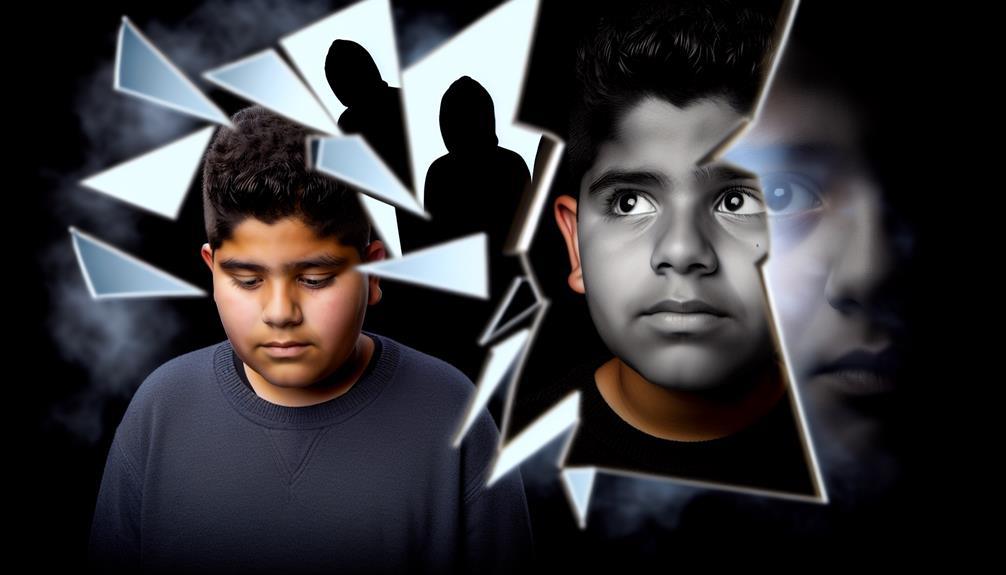In UK foster care, your child's mental health can be impacted by various factors. Placement instability can disrupt attachment development, leading to emotional issues. Contact with biological relatives, both enriching and tumultuous, influences a child's identity and emotional well-being. The quality of the foster parent-child relationship greatly shapes the child's development. School changes may induce stress, while a supportive social network can bolster emotional resilience. Past traumas can also seep into the child's everyday experiences. Therapeutic interventions can make a remarkable difference. Unpack these elements further, you'll gain deeper insights into your child's mental health journey in foster care.
Key Takeaways
- Placement instability can hinder secure attachment development and negatively affect children's mental health.
- Maintaining contact with the biological family can be both beneficial and detrimental, depending on the circumstances.
- Foster parent-child relationship, particularly attachment style and emotional regulation, significantly influences a child's mental well-being.
- The trauma experienced before entering foster care can manifest as anxiety, depression, and difficulty in forming healthy relationships.
- Therapeutic interventions, such as trauma and play therapy, are essential to help children process their experiences and improve their mental health.
Understanding UK Foster Care System

To truly grasp the factors affecting children's mental health in foster care, you need to first understand how the UK foster care system functions. The system is governed by a complex web of legislation, designed to safeguard the welfare of children in need, which includes children in foster care. Foster care legislation, such as the Children Act 1989, sets the framework and standards for the care and support these children receive.
However, the effectiveness of these laws relies heavily on the availability of support services. These services, ranging from therapy to educational assistance, are vital in mitigating the psychological stress often experienced by foster children. Unfortunately, the reality is that these services are often stretched thin, leading to delays or gaps in access which can exacerbate existing mental health issues.
Impact of Placement Instability
Traversing through the turbulent waters of foster care, children often face the unsettling reality of placement instability, a factor that can greatly impact their mental health. This instability can trigger a range of emotional and behavioural problems as they grapple with the uncertainty and unpredictability of their living conditions.
- Adoption Challenges: An unstable foster care placement can complicate the adoption process. The constant shifting of homes makes it difficult for potential adoptive parents to form connections, further prolonging the child's stay in the system.
- Lack of Consistent Caregiving: Every move means a new set of caregivers with varying parenting styles. This inconsistency can hinder the development of secure attachments, which are essential for their emotional and social development.
- Childhood Resilience: Despite these challenges, some children show remarkable resilience. However, this resilience is often stretched thin by the continuous changes, risking their mental health and well-being.
Role of Biological Family Contact

Understanding the role of biological family contact is an essential piece in the puzzle of a foster child's mental health.
It's a fine balance; maintaining family ties can foster a sense of identity and belonging, but the impact of parental interaction can also be destructive.
Let's unpack how this delicate dynamic plays out in a child's mental wellbeing.
Impact of Parental Interaction
Exploring the complex network of biological family contact can greatly impact a child's mental health in foster care. Particularly, parental neglect and communication barriers can be detrimental.
- Parental Neglect: When you're absent or neglectful, it can leave a foster child feeling abandoned, exacerbating mental health issues.
- Communication Barriers: These can prevent meaningful connections, leading to feelings of isolation and misunderstanding.
- Misdirected Anger: In some cases, a child's displaced anger towards their biological parents can manifest in behavioural issues.
Understanding these impacts and working to address them can make a significant difference. Remember, effective parental interaction isn't just about talking, it's about listening and responding in a nurturing way.
Balancing Family Ties
While the impact of parental interaction is significant, it's equally important to contemplate how maintaining contact with the biological family can play a role in a foster child's mental health. You must consider the delicate balance of family ties. Cultural sensitivity is critical here. Your understanding of their original family's cultural norms, language, and traditions can be cathartic, helping foster children maintain a sense of identity.
Moreover, don't overlook the power of sibling connections. If possible, try to preserve these relationships as they often provide much-needed emotional support and stability. Indeed, the foster care system can be a tumultuous ride, but with your conscious efforts to balance family ties, you can positively shape a child's mental health.
Influence of Foster Parent-Child Relationship
The connection you establish with your foster child can greatly influence their mental health, shaping their emotional stability and overall wellbeing. As a foster parent, your ability to understand and adapt to different Attachment Styles, as well as promoting Emotional Regulation, forms the foundation of a healthy relationship.
- Attachment Styles: Your interaction style can determine the type of attachment your foster child develops. Crucial attachment is important, but it requires patience, understanding, and consistent responses to the child's needs. It's not about being perfect; it's about being predictable.
- Emotional Regulation: Your role is to guide the child in managing their emotions. It's about teaching them that it's okay to feel their feelings and giving them the tools to navigate those emotions in a healthy way.
- Communication: Honest, open, and regular communication builds trust. Letting them know they're heard and their feelings matter can have a profound impact on their mental health.
Effect of School Transitions

Sailing through the often turbulent waters of school changes can greatly affect a foster child's mental well-being, necessitating your empathy and assistance to help them stay steady. School shifts can be stressful times, laden with academic pressure, compounded by the necessity to make new friends and fit into a new environment.
Bullying impact, a sad reality in many schools, can cause significant distress and further destabilize their mental health. As a guardian, you must remain vigilant, continuously checking for signs of bullying or academic strain. But it's not just about detecting problems; it's also about solving them.
Assist your foster child in developing coping strategies for academic pressure, such as time management skills, relaxation techniques, and a vital mindset. For bullying, foster open communication, encouraging them to share their experiences without fear of judgment. Remember, your actions can make a difference.
While you can't control the school environment or the behaviour of other children, you can create a safe space at home where they feel loved, understood, and supported. Understanding the impact of school changes is an important step in ensuring the mental well-being of foster children in the UK.
Importance of Social Support Networks
Caring for a foster child isn't a journey you need to take alone; building a strong social support network can be pivotal in promoting their mental health.
These networks provide a sense of belonging, enhance emotional resilience, and help to counteract negative peer influence. They can be composed of friends, family, community members, educators, or other foster parents who understand the unique challenges and triumphs of foster care.
Here are three ways social support networks contribute to a child's mental well-being:
- Community sense: A strong network gives a child a sense of belonging, essential for their self-esteem and identity formation.
- Resilience building: Supportive relationships can help foster children overcome adversities and build emotional resilience, enabling them to bounce back from difficulties.
- Peer influence: A positive social environment can mitigate the effects of negative peer influence, guiding children towards healthier attitudes and behaviors.
Impact of Pre-Foster Care Trauma

While a robust social network can greatly enhance mental wellbeing, it's equally important to understand how past trauma, experienced before entering the foster care system, can profoundly impact a child's mental health.
Children who've faced trauma often carry deep emotional and psychological scars into their foster homes. This prior trauma can manifest in various ways, including anxiety, depression, and difficulty forming healthy relationships. It's not a straight path; the effects of trauma can ebb and flow, resurfacing during times of stress or change.
Recognizing and addressing the impact of this pre-foster care trauma is vital. It's here where trauma coping strategies and resilience building come into play. These strategies help children navigate their feelings, providing them with practical tools to process their experiences. Resilience building, on the other hand, focuses on fostering a child's ability to overcome adversity, to bounce back from setbacks and to keep going despite challenges.
Role of Therapeutic Interventions
To support children in foster care as they grapple with past traumas, therapeutic interventions can play a critical role in their mental health journey. As you explore further, you'll find that these interventions' efficacy and benefits lie in their ability to target specific aspects of a child's emotional and psychological wellbeing.
- Trauma therapy efficacy: Trauma-focused therapy is a potent tool for healing. This targeted approach helps children confront their traumatic experiences, thereby reducing symptoms of distress and improving overall mental health.
- Play therapy benefits: Play is a universal language of children. In play therapy, children express, explore, and make sense of their experiences in a safe, controlled environment. It's beneficial because they can communicate their feelings without the pressure of articulating complex emotions.
- Family therapy: The importance of familial connections can't be underestimated in a child's mental health. Family therapy fosters better communication, understanding, and support within the family unit.
Frequently Asked Questions
How Does the UK Government Support the Mental Health of Foster Children?
The UK government supports foster children's mental health through various initiatives. They've increased mental health funding, providing resources like counselling and therapy to help these kids cope with their unique challenges.
What Mental Health Resources Are Available for Foster Parents in the Uk?
In the UK, over 80% of foster parents access therapy and support groups. You'll find mental health resources like counselling, therapeutic services, and various support networks available to aid in your foster parenting journey.
How Does the UK Foster Care System Handle Cases of Children With Pre-Existing Mental Health Conditions?
In the UK, children with pre-existing mental health conditions in foster care are managed through therapeutic interventions and closely monitored medication protocols. You'd find trained professionals providing tailored support to these vulnerable kids.
What Are the Legal Rights of Foster Children in the UK Regarding Their Mental Health Treatment?
In the UK, foster children's rights include access to proper mental health treatment. However, rights awareness is lacking, and legal loopholes can obstruct their care. It's important to understand and advocate for these rights.
How Effective Are the Uk's Policies in Preventing Mental Health Issues in Foster Children?
Assessing UK's policies on preventing mental health issues in foster children, you'll find mixed effectiveness. While therapeutic approaches are in place, gaps persist. It's vital to continuously reassess and improve these strategies for best results.
Conclusion
Just like a delicate seedling, a child's mental health in UK foster care is influenced by multiple factors.
The stability of placements, contact with biological family, the foster parent-child relationship, school changes, social support networks, past trauma, and therapeutic interventions all play a part.
Understanding these influences can help us nurture the seedling into a resilient tree, ensuring the best possible outcomes for these children moving through the foster care system.




